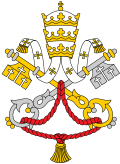Organization within the Roman Curia
This article needs additional citations for verification . Please help improve this article by adding citations to reliable sources. Unsourced material may be challenged and removed. Find sources: "Pontifical council" – news · newspapers · books · scholar · JSTOR (October 2013) ( Learn how and when to remove this message ) |
The topic of this article may not meet Wikipedia's general notability guideline . Please help to demonstrate the notability of the topic by citing reliable secondary sources that are independent of the topic and provide significant coverage of it beyond a mere trivial mention. If notability cannot be shown, the article is likely to be merged, redirected, or deleted. Find sources: "Pontifical council" – news · newspapers · books · scholar · JSTOR (July 2021) ( Learn how and when to remove this message ) |
A pontifical council was a mid-sized department or dicastery of the Roman Curia, the central organization responsible for assisting the Pope in the governance and oversight of the Catholic Church. Such a council had a cardinal or archbishop as its president and was restricted in its activities in comparison with the larger parts of the Curia. [1]
